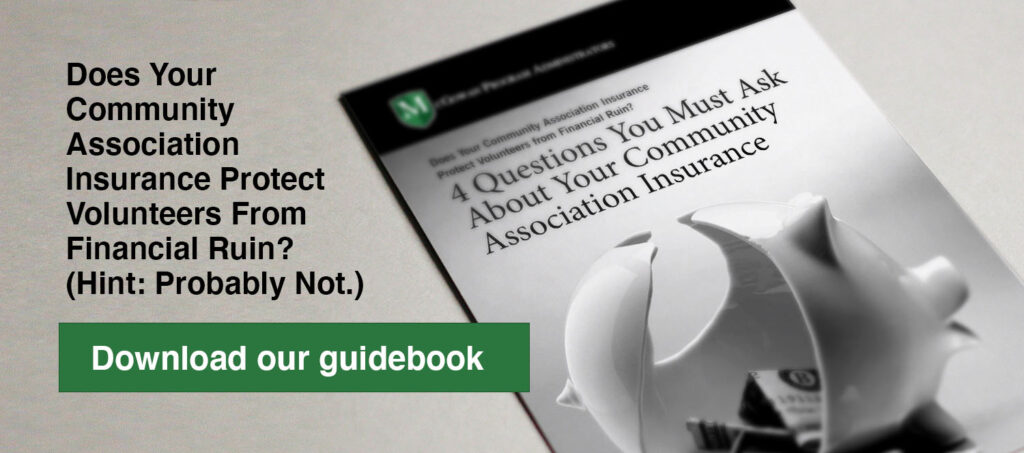Here’s the scenario: As a new unit owner of a condominium, you decide to throw your hat in the ring and run for the condo association board, excited to help maintain property values and build a great life for you and your fellow condo owners. Along comes a neighbor who decides to sue the board, sticking you with legal fees due to the association’s lack of insurance. Whoever thought that your neighbors would sue you?
While this occurrence can be disturbing to unsuspecting volunteer board members, it’s not unavoidable. For new members of community association boards, knowing what to expect from your duties is both wise and empowering, not to mention a necessity. In many cases of claims and/or lawsuits against association boards, it’s more likely than not that the unit owner claimant has not read the governing documents that you agreed to when closing on your unit until a problem arises. In a condominium or any other common interest, your unit is your castle but is subject to the governing documents you agreed to abide by.
To put it simply: Ignorance is not bliss for volunteer board participants. In this blog, we will discuss ways in which board members can sidestep potentially disastrous legal pitfalls.
Also read: HOA Reserve Studies: Is Your HOA Prepared?
Reading critical governing documents is a good start
To avoid potentially landing in court, community association unit owners should read the governing documents (including the CC&Rs, By-Laws and board-made rules) of their condominium before they buy and a volunteer board member should read them before they volunteer for the board. Ignorance of this critical information is no defense, as all association members are presumed to have studied the documents upon purchasing their unit. Also keep in mind that although your realtor and/or developer should make sure you read these items, they are not required to do so.
Also read: Condominium Unit Buyer Check List
Individuals who have shirked their required reading tend to be easy to spot, considering they may turn a volunteer board position into something beyond its stated purpose. To that end, each member joining a condominium association board should have a thorough knowledge of all governing documents before agreeing to sign on. In fact, we recommend that affirming that this has been done by a condition precedent to running for or agreeing to accept a board position.
Additionally, each board should engage in annual training activities, even for members with prior experience. The Community Associations Institute offers various training resources, including video courses that allow volunteers to prepare for a new board position. Ultimately, a prepared and knowledgeable community association board member will be ready for any challenge or complaint.
A community association board volunteer:
- Is charged with managing the association according to specific by-laws and statutes
- Makes decisions and policies while delegating responsibilities to capable individuals, community association professionals or community association managers
- Has no ability to act outside the authority given to them during a properly noticed board meeting
- Has one vote, even if he or she is also an officer of the association—be it president, vice president, or other – Beware of the overbearing, overzealous or the bully board member
- Is obligated to treat management of the association as a business
Responsibility is the watchword for any community association board
Most board tasks are delegated to the community association manager (aka CAM. A board not having an employee manager or independent management company will usually delegate the action to another community association board volunteer. In this case, the participant is carrying out the action as a “volunteer” rather than as a board member. In this capacity, the board member is limited to the authority extended by the majority of the board.
Volunteer boards are critical to a successful association. However, apathy is a huge obstacle for many associations. On the other hand, some boards have elections that remind us of the Trump v. Biden phenomena. Very often, apathy is the result of board meetings that are not run efficiently and are unnecessarily long. If a board meeting takes more than an hour, I believe that something is not being done in a manner that is unnecessary. Below there are a number of pointers that should help alleviate these issues making meetings more efficient, less acrimonious, and more successful. There are approximately 350,000 community associations nationwide and the vast majority run smoothly as they are not made more difficult than they need be. This is more often than not the result of not taking advantage of the resources and professionals available to the associations, such as the Community Association Institute and industry professionals.
Also read: The Risks of Aging Infrastructures for Community Associations
Knowledge is power for volunteer board members
The following are additional pointers that can help simplify board meetings and mitigate the risk of litigation:
- As most board meetings shouldn’t take more than an hour, volunteers should read the board packet, agenda items, and neighbor-produced questions before the meeting. If a board member does not have time to prepare, they should not volunteer for the board so as not to waste the time of those who are prepared.
- Adopt rules and stick to them; having a consistent set of rules in place is worth the effort.
- Remove rules that are no longer relevant or that are not enforced.
- Institute some form of Roberts Rules of Order or other meeting rules.
- Do not deviate from the prepared agenda. Items not on the agenda should be tabled for a future meeting. The president’s main role is to lead a meeting and keeping the board on task.
- Never tolerate a lack of civility or disruptions to board proceedings. If necessary, adjourn the meeting to discuss further action with counsel.
- Inappropriate questions do not need to be answered, which is where an established set of rules can be useful.
- Even if an open meeting is not required by governing documents, keeping meetings open will avoid any appearance of secrecy or deception. However, open meetings do not mean a free for all.
- Preparing a short “life in our community” video can be an excellent tool to make available to potential buyers and new unit owners, not to mention renters. Putting this on the website or YouTube is incredibly simple and can short circuit many issues. This also indicates how the association is managed and what the applicable rules are that protect the association and its presented lifestyle.
A community association board understanding its duties, not to mention the rules under which it operates, is the best method of risk management. To learn how McGowan MPA can further assist your community association board, read more here.



